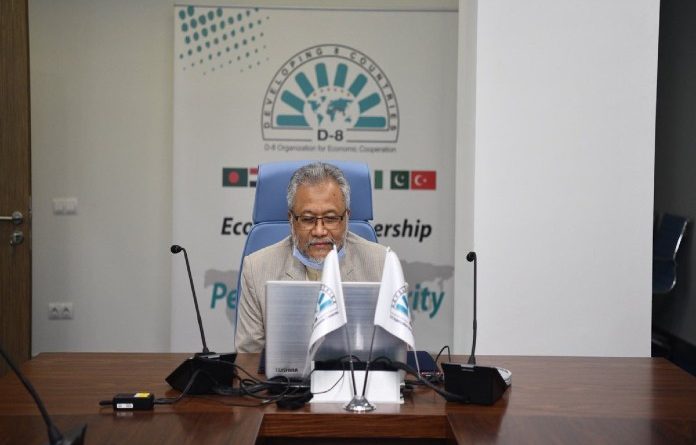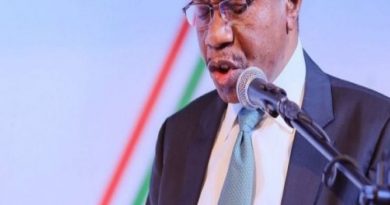D-8 Member States To Strengthen Cooperation And Solidarity to Tackle COVID-19 Pandemic
Oru Leonard
The D-8 Health and Social Protection Programme Office (D-8 HSP) in Abuja and Chatham House jointly organised the first virtual roundtable of health professionals of the D-8 Member States on 16th of April, 2020 in order to discuss the COVID-19 Pandemic. The meeting was attended by professionals from the Ministries of health and Foreign Affairs of the Member States as well as International Organizations such as Chestrad International and Corvus Health from USA, as well as officials of Chatham House, Malaysian Technology Development Cooperation (MTDC) and the Islamic World Science Citation Center of Iran (ISC).
As the world struggles to overcome the COVID-19 pandemic and its huge disruption to livelihood, economy and health systems, the Developing-8 Organization for Economic Cooperation has intensified solidarity and cooperation among its Member States in efforts to identify constraints and bottlenecks in tackling the COVID-19 pandemic as well as to develop a mechanism to build post-pandemic resilient health systems.
According to Md. Tohidul Islam, Senior Information Officer, of the Bangladeshi Ministry of Foreign Affairs, the prime objective of the virtual roundtable was to come-up with a mechanism for cooperation in order to lessen the hardship caused by the pandemic through knowledge and resources sharing as well as understanding of country specific needs.
During the meeting, the D-8 Member States reviewed the countries’ contexts and impact of the pandemic and shared some ideas and innovative solutions implemented by them in line with global best practices.
The Secretary General of the D-8, Ambassador Dato’ Ku Jaafar Ku Shaari, while addressing the meeting, stressed that the D-8 Member States have to use the D8 Health and Social Protection Programme window to support one another in these trying times. He also emphasized the need to improve partnerships, experience sharing and mutual support and assistance in order to mitigate the consequential adversities of the pandemic. The Programme Director of D-8 HSP, Dr. Ado Muhammad called for solidarity in areas of commodities, technology, equipment, pharmaceuticals
Earlier, in line with Prime Minister Sheikh Hasina’s directive to engage at regional and global fora to explore collective solutions on the Covid-19 crisis, Bangladesh took the lead to organise such a meeting as D8 HSP. In this respect, Foreign Minister Dr. A. K. Abdul Momen wrote a letter to his Turkish counterpart, (where Turkey is the current Chair of D-8), to explore options for activating D8 HSP window to support each other during this crisis. A delegation comprising of health professionals and administrators from COVID 19 National response team, led by Professor Dr Sanya Tahmina. Director General of DGHS represented
The virtual session was moderated by the Programme Director of the D-8 HSP, Dr. Ado Muhammad and Director, Global Health Programme, Executive Director, Centre for Universal Health of Chatham House, Mr. Robert Yates.
Prof Dr. David Heymann, Epidemiologist and public Health Researcher, gave a briefing to the participants on best practices in global health and security, and also highlighted the importance of implementation of same in order to curb the pandemic.
In the same vein, professionals from international organizations discussed the importance of multi-lateral public-private partnerships and joint evaluation of research and innovation in order to tackle the pandemic.
The meeting also evaluated the consequential adversities of the COVID-19 pandemic from the economic point of view.
As a result of the productive discussions at the virtual meeting, two Working Groups have emerged: Implementation Monitoring Group- to provide weekly updates and recommendations
At the request of Bangladesh – the incoming Chairman of the next D8 Summit, the meeting also decided to establish a separate Working Group to commence assessment of the impact of COVID-19 on the national economies of the Member States. When established, the Working Group will dis-aggregate data on GDP, Employment and poverty and suggest effective ways for the D-8 Member States to quickly get out of the woods.
The D-8 further plans to host a meeting of the D-8 Ministers of Health on the sidelines of the 2020 World Health Assembly, which is scheduled later in May.




